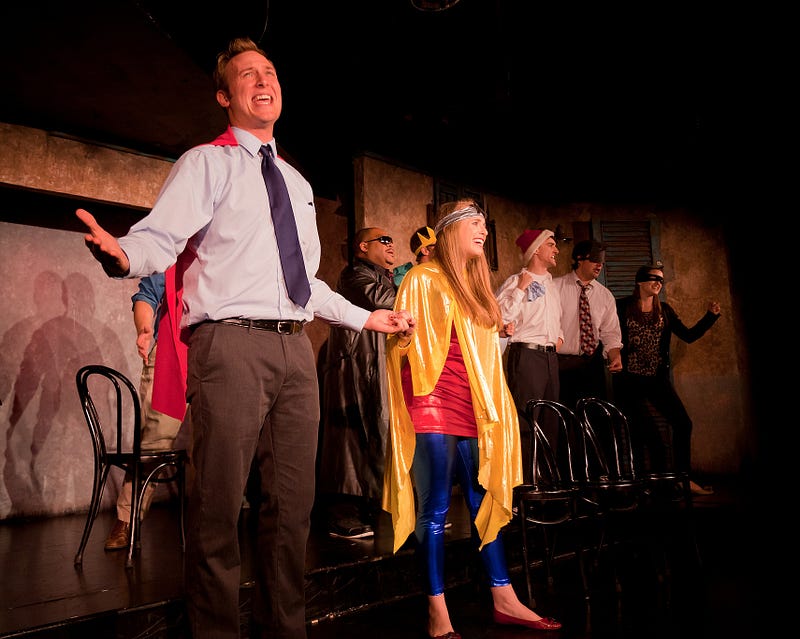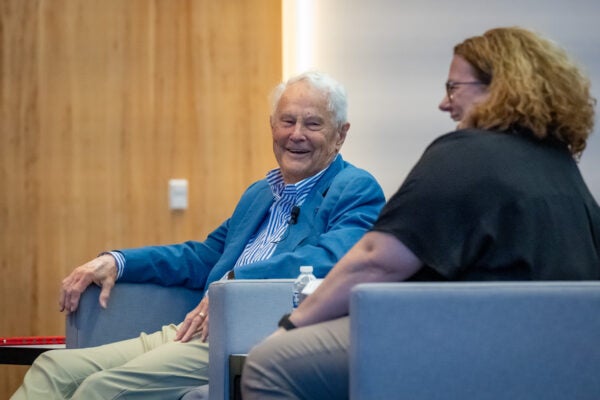Improvisation at Work
The benefits of bringing improv skills to the office
By Jeremy M. Simon

While working long, demanding hours as a consultant for Deloitte, Ryan Barcza, MBA ’15, found a creative outlet in the improvisation classes at Chicago’s legendary comedy club Second City.
The classes, Barcza says, were “incredibly fulfilling and rewarding,” and provided more than just a fun diversion. Back at the office, when he needed to boost team members’ confidence about speaking up Barcza turned to improvisation exercises.
His approach is increasingly popular. In recent years, improv has moved beyond theater spaces and entered business and corporate settings. McCombs School of Business students and alumni count themselves among evangelists for the benefits of improv. Devotees say they have found its techniques lead to more creative brainstorming, better listening skills, and an unflappable attitude toward challenges — all much-needed talents in any office.
More than Comedy
Many audiences first experience improv after seeing it performed on TV (such as the popular show “Whose Line is it Anyway?”) or in an improv theater, where whole scenes are created from scratch, often using audience suggestions. In recent years, sessions at SXSW and other conferences have exposed businesspeople to the high-pressure, low-risk creative environment characteristic of improv.
Although it’s often funny, improv “touches on so many things that are important in the world and the workplace that aren’t necessarily comedy,” says corporate attorney Gail Papermaster, MBA ’83, who first tried improv classes after a friend invited her to a free workshop. “I went and it was just crazy fun,” Papermaster says, prompting her to enroll in improv classes. She’s taken classes on and off ever since.

Preparing for the Unexpected
For starters, improv can prepare you for tackling unexpected situations. Whether it’s a glitch in your PowerPoint presentation to clients, a job interview question that catches you off guard, or a spontaneous conversation during a networking event, work provides plenty of surprises.
Improv helps you “react comfortably to whatever comes your way,” says Durham Kyle, MBA ’16, president of the MBA Improv group made up of graduate business students who want to learn improv skills.
Jacob Thompson, BBA ’17, agrees. Thompson, who is pursuing degrees in both finance and theater, is a member of two campus improv groups at The University of Texas at Austin: Gigglepants and SNAFU. Thompson says he enjoyed the daily variety of his summer internship at Merrill Lynch in Dallas, including giving a major presentation on his second day at work. But as an undergrad, he says improv has proven handiest in job interviews where he’s been better prepared to shape his stories to fit a potential employer’s questions.
“Doing improv teaches you how to have a presence on the stage and how to really speak well publicly, but in addition to that, it also trains you to think quickly on your feet,” he says.
Yes, and
Amira Pollock, a coach in the MBA+ program, brings improv concepts to her work teaching communication skills to McCombs graduate students.
“The principles of improv are to be positive, make your partner look good, [and] have fun. If we all did those things more in the business world, it would make everything run more smoothly.” — Amira Pollock
That positive outlook is reflected in the golden rule of improv, known as “yes, and.” It instructs that when a performer introduces a new thought, rather than critiquing or rejecting it, the other actors should affirm and then build upon that idea. For example, if one performer pretends to be a dog, but the other performers don’t play along, the scene fails. Instead, a fellow actor adding, “Yes, you’re a good dog, Fido, and here’s your bone,” moves the scene forward.
“Yes, and” has obvious benefits for office brainstorming sessions. MBA alum Barcza, director of marketing at software firm Riskpulse, says colleagues can be too quick to dismiss an idea. But asking to hear more from that coworker establishes a creative environment where people feel comfortable speaking up.
Introducing Improv to MBAs
After his experience in Chicago, Barcza became something of an improv ambassador when he came to McCombs. It started with his MBA application.
In his short essay, Barcza wrote that an improv club would give MBAs a place outside of the classroom to learn to become more responsive, adaptive, and innovative. Once he got to campus, Barcza took action. He co-founded the school’s MBA Improv group with classmates and conducted workshops during his two years in the program, before passing the baton to the next MBA class.
Nikki Bruce, MBA ’15, was a member of that group, where she learned to avoid freezing up when facing a difficult situation. “It takes practice to push past that awkwardness,” she says.

Workplace Skills
Bruce continues to apply improv lessons in her work as a consultant. “When meeting with a senior-level client executive for the first time to pitch an idea to get her approval, I can be comfortable being uncomfortable and won’t let nerves get in the way of making a good case for an idea or responding to questions,” Bruce says.
Of course, forcing yourself to take risks can make anyone feel uncomfortable, says Pollock, the MBA+ coach. “It’s all about how you manage that insecurity and how you deal with that inner critic,” she says.
Improv also teaches actors to remain present. Rather than anticipating what’s going to happen next, good improvisers pay attention to each moment. Lauren Montgomery, MBA ’17 — who has studied improv with the Groundlings, Second City, and Upright Citizens Brigade — says that a scene’s success or failure depends on each performer listening carefully to his or her teammates. Practicing that skill has aided Montgomery at work.
But even a scene’s failure offers valuable lessons about resilience. “The only way to be good at improv is to fail a lot. It’s trained me to just keep getting up and trying again,” Montgomery says.
Since making bold choices is the best way to build a scene and learn, improv has also trained her to fail big. At work, that’s inspired Montgomery to offer up more risky ideas.
“When presenting to a boss or colleague, they may not always embrace the bold idea, but it generates great discussion and building blocks for other ideas in a way that a safe idea might not.” — Lauren Montgomery
Originally published at www.today.mccombs.utexas.edu.
About this Post
Share:


